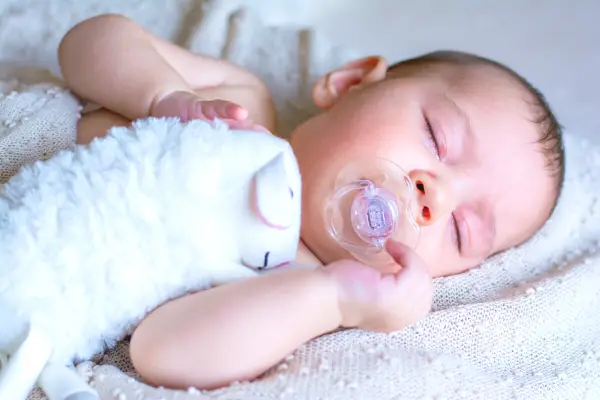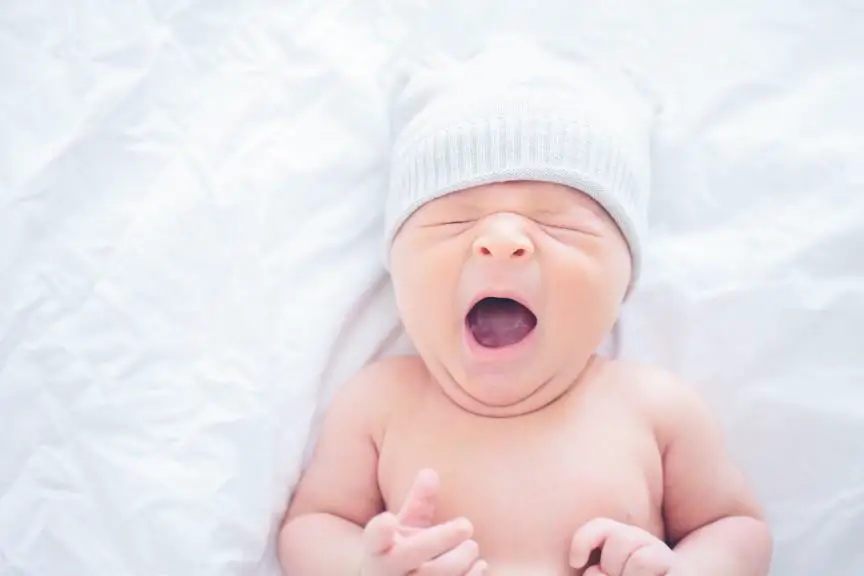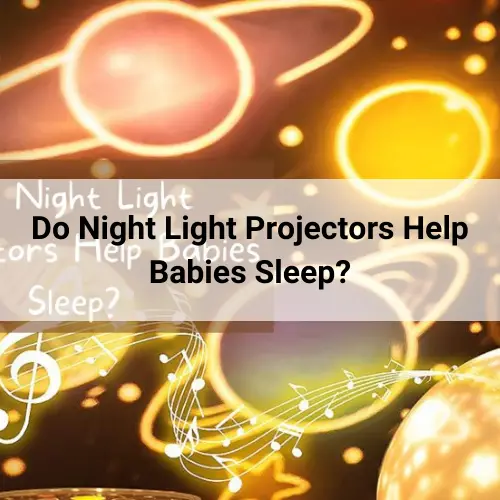A sleepless baby can lead to immense strain and pressure on parents. Many people might simply pass the comment that sleeplessness in babies is expected and often disappears after a while. However, studies have now shown that severe sleeplessness in babies might actually be a sign of mental health issues to come.
Being a parent is stressful, there always seems to be so much that can go wrong, so staying on top of everything, while dealing with extreme tiredness, can almost be impossible at times. In order to help yourself worry a little bit less, it is important to know the signs and symptoms to look for with certain disorders, knowing when to seek help.
Table of Contents
Mental Health Issues In Infancy
It can be extremely difficult to diagnose mental health issues in babies when they can’t talk or display the usual symptoms used in diagnosis. There are also certain environmental factors and family histories that could increase the chance of mental illness in babies so these could see to help the mental health issue worsen as time goes on, making it even more difficult to discover in infancy.
Babies are capable of feeling stress, anxiety and even depression. This is a scary thought, especially as babies use one form of communication for all their problems – crying. How do you differentiate between a hungry cry and a stress cry? If you feel like your baby cries excessively, or has severe sleeping issues, it is important to seek professional help.
The sooner a mental health issue is diagnosed or recognized, the sooner treatment can start. This could help hinder the effect of the mental health issue, stopping it from developing to a point which is hard to come back from.
There are some other signs of mental health issues that may be present in babies or toddlers. These can be problems with temper tantrums, extensive crying, feeding problems, and temperament problems. These may present on their own or in a culmination of behavioral problems that are easier to recognize.
Recognizing the Signs
Luckily, through extensive research, there are certain traits and behaviors that can be linked to possible mental illness developing in babies. As a parent, it is important to know what to look out for and when to seek help. The sooner you recognize an issue, the sooner it can be addressed by a professional.
Attachment issues

Babies form attachments to parents and other loved ones in their lives. These attachments formed are the first steps in a baby learning to love, and helps them learn to maintain healthy relationships throughout life. There are some factors not related to mental illness that could cause attachment issues, such as abuse or being separated from parents, but attachment issues in a normal, healthy household can be a sign of mental health problems to come.
Attachment issues can be a sign of autism or ADHD, and these attachment problems can present in the baby being difficult to comfort, having an aversion to touching, avoiding eye contact, not smiling and being withdrawn.
Attachment issues can be quite distressing for parents, as they might feel like it is something they have done for their baby not to love them back, but this really isn’t the case at all.
Inconsolable Baby
Studies have found that children who suffer from behavioral issues or mental health issues usually had excessive crying or sleep issues when they were infants. An inconsolable baby can be due to colic, over-stimulation, boredom or sensitivity, but in some cases, it can be a sign that the baby might develop mental health issues later on in life. As difficult as it might be, parents need to remember to stay calm and in control when dealing with an inconsolable baby. By becoming stressed and frantic, you could add to your child’s stress and anxiety.Limited Eye Contact
When it comes to babies, eye contact is actually a sign of good development and a sought after milestone. It helps promote a bond by creating an emotional connection between the baby and parent. Insufficient eye contact or avoiding eye contact altogether is a sign that something might be wrong. Autism and other mental health issues may all present early signs such as avoiding eye contact as a baby. If you notice that your baby doesn’t make eye contact regularly or at all, take them to be seen and assessed by a professional.Parents With Mental Illness
A baby with a parent who suffers from a mental health issue is at a greater risk of developing mental health issues as well. This could be from either genetics or living in an unstable home. As a parent who has mental illness issues, it is important to remember not to hide your illness. Making mental health issues an open topic of conversation, and dealing with them in a healthy manner, is a great way to avoid any anxiety over it for children. Professionals are there for a reason. Seek out help to deal with your mental health problems. The help and advice will benefit yourself and your family, creating a stable home for your baby to grow in. It is also so important for the child to have a strong bond with the parent suffering from mental health issues. This encourages feelings of love and acceptance, no matter the mental state of the parent.Severe Sleep Issues
Yes, new parents will experience sleeplessness and tiredness in the first few years. Waking up during the night to feed and change nappies is completely normal. However, excessive sleep issues can be a huge sign of mental health issues to come. It is not so much the case that poor sleeping habits lead to mental illness, or that mental health issues result in bad sleepers, but a bit of both that works in an unfortunate cycle. Children can suffer from insomnia, hypersomnia, and parasomnia, so it is important to get a proper diagnosis from a professional to help you have a plan moving forward. Another way of improving your baby’s sleep is this comfy wearable sleeping bag. Click here for more details.Not Reaching Milestones
Life as a parent can be stressful, you are always looking to make sure your baby hits their next milestone, documenting it each step of the way. But what happens when your baby starts to show signs of skill regression? A normal, healthy baby who starts to lose fine motor skills and language abilities might be at risk of mental health issues.
This can be extremely scary for parents, so once you notice signs of skills regression you should take your baby to see a professional to have them assessed. Sometimes, a baby might forget a skill or two by spending time practicing a new skill, but this is easily recognized and can be tested quite easily.

Under-Responsive Baby
Hyposensitivity in babies can present itself in different forms. A baby might not notice touch or temperature extremes and may not be able to recognize if they are clean or dirty. A baby who experiences hyposensitivity might not fuss when they are hungry, tired or dirty. The will appear low in energy and distracted in their own world.
Diagnosing this can be difficult as there is no definitive test to tell straight away. A professional will examine the baby and dive into family history, as well as the baby’s daily life. However, it is so important to have your baby checked by a professional as this is a sign that there may be some mental health issues such as Sensory Processing Disorder or Reactive Attachment Disorder.
A Vicious Cycle
Everyone recognizes how difficult it can be for a parent who has a sleepless baby, but often the baby’s own stress and sleeplessness is not acknowledged. Babies require more sleep than adults, and your baby missing out on sleep is a big deal.
There is no definitive proof whether mental health issues cause sleeplessness or vice versa, but instead, it seems to be a vicious cycle that continuously aggravates the situation. Going by this understanding, it would make sense that by recognizing the signs of potential mental illness in a baby and finding early treatment might actually go a long way in bettering the baby’s sleep cycle, therefore lessening their stress and anxiety as well.
Sleeplessness and Mental Health Issues
It is true that many parents will go through stages of sleeplessness and exhaustion, but a parent who experiences this constantly, to the point of not being able to function, needs to realize that there might be more wrong than just having a fussy baby.
With it being recognized that sleeplessness in babies can be linked to mental health issues, it is critical to seek professional help if you think there is a chance your child is at risk. The sooner the problem is recognized and attended to, the more chance there is that your child can receive treatment sooner, lessening the effect of the mental health issue.
Nothing is too big for a parent to handle. You need to support your child and find support for yourself. Know your baby, and know when it is time to seek help.
If you’d like to read more about baby sleep, please see:
Related Articles:

Rebecca Brown
Rebecca Brown is a mom to two and writer on all things parenting. She has been focussed on content creation and article writing for the last four years, drawing on the inspiration she gets from her own experience as a mother, and the expansive research the job requires.
When not writing, you can find Rebecca outside with the kids, or hidden away enjoying a good cup of coffee!





